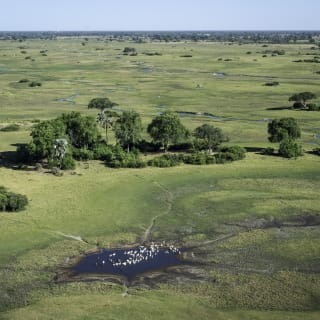
Vaccinations and Health Precautions for Botswana
Stay Healthy and Safe in Botswana
Stay Healthy and Safe in Botswana
Botswana, the heart of Africa, captivates travelers year after year with its pristine landscapes, unique wildlife, and breathtaking natural wonders. However, along with its beauty, traveling to this subtropical destination comes with specific health challenges. Extreme weather conditions, geographical isolation, and limited infrastructure make thorough health preparation essential for anyone planning a trip to Botswana.
From scorching summer temperatures of up to 104°F (40°C) with high humidity to chilly winter nights near freezing, Botswana’s climate demands physical resilience. At the same time, the vast, sparsely populated areas and remote conservation parks can complicate access to medical care in emergencies. Additionally, specific health risks such as malaria or insect-borne diseases pose a danger to travelers without adequate precautions.
Key Vaccinations for Travel to Botswana
Careful vaccination planning is critical when traveling to Botswana to minimize potential health risks. Below is an overview of mandatory and recommended vaccinations, as well as specific requirements for travelers from yellow fever endemic regions.
Mandatory and Recommended Vaccinations
Mandatory Vaccinations
A yellow fever vaccination is only required under specific circumstances. Travelers must provide proof of vaccination if they are arriving from a yellow fever endemic area or have had a transit stop exceeding 12 hours in such a region. For direct arrivals from non-endemic countries, like Germany, no vaccination is necessary.
Recommended Standard Vaccinations
Travelers should ensure that their standard vaccinations are up-to-date in accordance with the recommendations of the Robert Koch Institute (RKI). These include:
- Tetanus
- Diphtheria
- Polio
- Measles, Mumps, and Rubella (MMR)
Recommended Travel Vaccinations
In addition to standard vaccinations, travelers are advised to consider the following:
- Hepatitis A: Highly recommended due to the risk of transmission through contaminated food or water.
- Typhoid: Advised for longer stays or travel to areas with poor sanitation.
Vaccinations for Specific Risk Groups
Depending on the type and duration of travel, additional vaccinations may be necessary:
- Hepatitis B: Recommended for those with close contact with the local population or for long-term travelers.
- Rabies: Particularly relevant for trekking trips or extended stays in rural areas.
- Meningococcal Disease: Recommended for long-term stays or increased exposure risks.
Special Vaccination Requirements for Yellow Fever Endemic Regions
The yellow fever vaccination is crucial for travelers entering Botswana from yellow fever endemic areas. According to the World Health Organization (WHO), these are regions where the virus is highly transmissible. A valid yellow fever vaccination certificate is mandatory to prevent the introduction of the virus into Botswana.
For travelers arriving exclusively from non-endemic countries, this requirement does not apply. However, a yellow fever vaccination remains a vital consideration for those planning onward travel to other African countries where similar vaccination certificates are required.
By following these vaccination recommendations, travelers are well-equipped to face Botswana’s health challenges and can fully enjoy their journey. In the next section, we’ll explore malaria risks and preventive measures in greater detail.
Malaria Risks and Prevention Strategies
For travelers to Botswana, malaria represents one of the most significant health risks. The level of risk varies greatly depending on the region and season, making thorough preparation and targeted protective measures essential.
High-Risk Malaria Areas and Seasonal Variations
The highest malaria risks are found in the northern parts of Botswana, particularly in the Okavango Delta and the northern sections of Chobe National Park. These regions are affected year-round, with the rainy season from November to May significantly increasing the risk. Central areas south of Francistown, including the Central Kalahari, face a moderate risk, particularly during the rainy season. In contrast, southern regions, including the capital Gaborone and the Tsabong area, are largely malaria-free.
Seasonal fluctuations require special attention: During the dry season from June to October, the risk decreases substantially in most areas but remains present in the northern regions. Travelers should carefully plan their travel routes and timing and stay informed about the current malaria situation in the areas they intend to visit.
Malaria Prevention Options
To effectively minimize the risk of malaria, two key approaches should be combined: exposure prevention and medication prophylaxis. Both strategies work together to provide comprehensive protection.
Exposure Prevention
The first line of defense against malaria is protecting yourself from mosquito bites. Travelers should wear long, light-colored clothing that covers as much skin as possible and regularly apply insect repellents containing DEET or Icaridin. Additionally, sleeping under insecticide-treated mosquito nets provides effective protection, especially in high-risk areas.
Medication Prophylaxis
Depending on the region, duration of stay, and individual tolerance, several medications are available for malaria prevention:
- Atovaquone-Proguanil (Malarone): This is an ideal choice for short trips. It should be taken 1–2 days before entering the malaria region, daily during the stay, and for 7 days after leaving the area. It is well-tolerated, though occasional side effects such as stomach pain or headaches may occur.
- Doxycycline: A cost-effective alternative, this medication is also taken 1–2 days before travel. It must be taken daily during the stay and for 4 weeks after leaving the area. Side effects can include skin sensitivity to sunlight and gastrointestinal discomfort.
- Mefloquine (Lariam): Taken weekly, this medication should be started at least two weeks before entering the malaria area and continued for four weeks after leaving. However, due to potential severe side effects such as psychosis or seizures, it is only suitable for specific individuals.
- Chloroquine: This option is only viable in areas with low malaria resistance. However, it is not recommended for most regions in Botswana due to widespread resistance.
The choice of the right medication depends on individual factors, including the destination, type of travel, and personal health conditions. Consulting a travel medicine specialist before departure is crucial to develop the best prevention plan.
By combining exposure prevention and medication prophylaxis, travelers can significantly reduce their malaria risk and enjoy their trip to Botswana with peace of mind.
Health Protection in Specific Regions
Botswana’s natural wonders, including the Okavango Delta and Chobe National Park, rank among the most spectacular travel destinations in the world. However, these regions also come with specific health risks that travelers need to be aware of and prepared for.
Health Risks in the Okavango Delta, Chobe, and Francistown
Okavango Delta
The Okavango Delta has a high year-round malaria risk, which increases during the rainy season (November to May). In addition to strongly recommended malaria prophylaxis, travelers should consistently practice mosquito protection measures. These include wearing long clothing during dawn and dusk, sleeping under insecticide-treated mosquito nets, and using insect repellents.
Another health risk in the Delta is bilharzia (schistosomiasis), a parasitic infection transmitted by freshwater snails. To minimize this risk, travelers should strictly avoid contact with freshwater sources.
Chobe National Park
Known for its dense wildlife population, Chobe National Park presents similar health risks. In addition to malaria and bilharzia, there is a higher risk of tick-bite fever, especially at the end of the rainy season (March/April). Travelers should combine mosquito protection with precautions against tick bites, such as wearing protective clothing and thoroughly checking their bodies after outdoor activities.
Francistown
Francistown, a major city in northern Botswana, has a moderate malaria risk. Malaria prophylaxis and mosquito protection are highly recommended here as well. Since medical infrastructure in rural areas outside of the cities is limited, travelers should always carry a well-stocked first aid kit when visiting remote locations.
Protection Against Bilharzia
Bilharzia, also known as schistosomiasis, is prevalent in many freshwater regions in Botswana. It is caused by contact with water inhabited by parasite larvae from freshwater snails. Key risk areas include the Limpopo, Molopo, and Chobe Rivers, as well as the waters of the Okavango Delta. However, the risk can be significantly reduced with simple precautions.
The best strategy is to avoid direct contact with untreated freshwater. Swimming or wading in rivers and lakes should generally be avoided. Travelers can instead opt for chlorinated swimming pools, which provide a safe alternative. In some parts of the Okavango Delta, there may be safe bathing spots—consulting an experienced local guide can help identify these options.
Currently, there is no vaccine for bilharzia, making prevention especially important. Travelers who, for specific reasons, cannot avoid contact with freshwater should seek detailed medical advice and be vigilant about potential symptoms. Although preventive medication for bilharzia is not taken beforehand, timely medical evaluations and treatments are an effective way to manage the condition.
With these precautions in mind, travelers can enjoy Botswana’s picturesque landscapes with peace of mind, creating unforgettable memories in one of nature’s most stunning settings.
General Travel Medical Preparations
Thorough preparation is the key to enjoying your trip to Botswana without worries. Packing the right medications and protective measures is essential to safeguard yourself from potential health risks.
Essential Medications and Equipment
Your travel medical kit should be carefully assembled and tailored to your individual needs. In addition to personal long-term medications, the following items are essential for your luggage:
- Medications: Treatments for diarrhea, nausea, pain, and fever, as well as malaria prophylaxis and emergency medications if necessary.
- Sunscreen: High SPF sunscreen is indispensable due to the intense African sunlight.
- Insect Protection: Repellents with active ingredients like DEET or Picaridin provide effective protection against mosquitoes and other insects.
- First Aid Supplies: Disinfectants, bandages, adhesive plasters, and a thermometer for minor injuries or illnesses.
- Electrolyte Powders: To prevent dehydration during high temperatures or after gastrointestinal illnesses.
Additionally, purchasing international health insurance with an option for medical evacuation is highly recommended to ensure coverage in case of emergencies. Travelers with pre-existing conditions should consult their doctor before departure.
The Importance of Mosquito Protection
As Botswana is a malaria-prone area, particularly in the northern regions like the Okavango Delta and Chobe National Park, consistent mosquito protection is vital.
- Repellents: Products containing DEET or Picaridin are highly effective. Alternatives like PMD (lemon eucalyptus extract) are also reliable.
- Protective Clothing: Long, light-colored clothing made from tightly woven fabrics, as well as clothing treated with insect-repellent technology, provides a physical barrier.
- Mosquito Nets: Impregnated nets, especially those effective against resistant mosquito species, are essential for sleeping in malaria-exposed areas.
A multi-layered approach—combining repellents, protective clothing, and mosquito nets—offers the best protection. Be sure to apply and use all protective measures regularly and correctly to minimize the risk of insect bites and related health risks.
With a well-prepared medical kit and effective mosquito protection strategies, you can embark on your journey to Botswana with confidence and peace of mind.
Dealing with Common Health Risks
Botswana’s breathtaking natural beauty offers countless adventures but also presents health challenges that travelers should be prepared for. Common issues such as gastrointestinal illnesses, injuries during outdoor activities, or intense sun exposure can disrupt your trip. However, with the right precautions and a well-equipped medical kit, many risks can be effectively minimized.
Precautions Against Gastrointestinal Illnesses and Injuries
Preventing Gastrointestinal Illnesses
Gastrointestinal illnesses are among the most common health complaints when traveling to Botswana. To prevent these, travelers should:
- Only drink bottled or boiled water.
- Avoid ice cubes and consume only thoroughly cooked meals.
- Maintain proper hand hygiene, ideally using disinfectants.
If illness does occur, electrolyte solutions can help prevent dehydration, and anti-diarrheal medications like Loperamide can provide relief if necessary.
Avoiding Injuries During Outdoor Activities
Botswana is renowned for its thrilling outdoor activities such as safaris and hiking. However, these come with a heightened risk of injury, particularly in encounters with wildlife or navigating rugged terrain. Carrying a first aid kit is essential. Minor wounds should be cleaned and disinfected immediately to prevent infection. If there are signs of infection, a doctor should be consulted without delay.
For walking safaris, maintaining a safe distance from both live and dead animals is crucial to avoid injuries or exposure to health risks such as anthrax.
Healthcare in Gaborone and Sibuyu
Urban Healthcare
Medical care in Botswana varies significantly between urban centers and remote regions. In cities like Gaborone and the urban area around Sibuyu, modern hospitals and clinics are available, offering at least basic medical services. However, even in these areas, there may be occasional shortages of medications or equipment. Travelers should familiarize themselves with local healthcare facilities in advance and keep the contact details of doctors or hospitals easily accessible.
Rural Healthcare
In remote areas such as the Okavango Delta or Chobe National Park, healthcare services are far more limited. Long transportation times and delays in emergency care are common. This makes having comprehensive travel insurance with medical evacuation coverage absolutely essential to ensure protection in case of an emergency.
With these precautions and thoughtful planning, travelers can effectively reduce the most common health risks in Botswana and fully enjoy their journey with peace of mind.
Preparing for Medical Emergencies
A trip to Botswana promises adventure and unforgettable experiences, but careful preparation for potential medical emergencies is essential. While cities like Gaborone and Francistown offer a solid foundation of medical care, these services often do not meet European standards, and access to healthcare in remote areas such as the Okavango Delta can be extremely limited. A comprehensive emergency plan is, therefore, indispensable.
Travel Insurance Options and Emergency Plans
One of the most important preparations for travelers to Botswana is securing comprehensive international health insurance. This insurance should include:
- Unlimited coverage for medical treatments and hospital stays.
- Rescue and evacuation costs, including helicopter rescues—essential for remote regions.
- Medical repatriation to the home country to ensure optimal care in case of severe emergencies.
A noteworthy option for travelers is registering with services like Okavango Air Rescue. This local service provides air rescue for emergencies in Botswana’s northern regions, offering a vital safety net for travelers in remote areas.
Additionally, understanding the local medical infrastructure is crucial. In Gaborone, modern facilities such as the Life Gaborone Private Hospital or the Princess Marina Hospital are available. For emergencies in remote areas, Botswana has established mobile health clinics and air rescue services like Medical Rescue International (MRI). However, long transport times and limited resources in rural areas can still pose challenges.
Elements of a Thorough Emergency Plan
An effective emergency plan should include:
- A well-stocked medical kit, with medications for common ailments such as diarrhea, fever, and pain.
- Information about available medical facilities along the travel route, especially for travelers with pre-existing conditions.
- A disaster management plan for unexpected situations, incorporating the use of decentralized healthcare services and local rescue options.
Botswana offers incredible opportunities for independent travel, but a solid plan to handle medical emergencies ensures that adventures don’t turn into unnecessary risks. With the right insurance coverage and a clear emergency strategy, travelers can explore the country confidently and safely.
Sources for Up-to-Date Travel Health Information
Proper travel preparation starts with reliable information—especially when it comes to health risks and preventive measures. For trips to Botswana, it’s essential to consult current travel health updates to ensure you’re well-informed and protected. Fortunately, there are numerous trusted resources, apps, and platforms available to help travelers prepare thoroughly.
Trusted Information Sources
The following international and national organizations are key sources for travel health information:
- World Health Organization (WHO): The WHO provides global health information and comprehensive travel advice tailored to specific risks in different countries.
- Centers for Disease Control and Prevention (CDC): This U.S. agency offers detailed health information, country-specific vaccination recommendations, and outbreak alerts.
- National Travel Health Network and Centre (NaTHNaC): A UK-based resource with extensive travel health guidance and vaccine recommendations.
- European Centre for Disease Prevention and Control (ECDC): This European organization provides insights into health risks and offers safety recommendations for travelers.
- German Foreign Office (Auswärtiges Amt): Offers country-specific travel and safety advice, including health information for German travelers.
- Fit for Travel: A Scottish NHS website providing comprehensive health advice specifically for travelers.
- International Society of Travel Medicine (ISTM): Lists travel clinics worldwide and provides useful travel health resources.
For optimal preparation, travelers should consult these sources 4–6 weeks before departure. Early planning is especially important for vaccinations and malaria prophylaxis.
Recommended Apps and Platforms
In addition to traditional websites, modern apps provide practical, on-the-go support for travelers:
- Healix Travel Oracle: Offers real-time updates on security incidents and disease outbreaks worldwide. Features include country profiles, emergency functions, and document storage.
- Sitata: Provides alerts on travel risks, disease outbreaks, and a directory of emergency numbers and hospitals, making it a valuable travel companion.
- CDC TravWell: This app from the CDC includes vaccination and medication advice, health alerts, and travel preparation checklists.
- Travel Smart: The premium version delivers real-time notifications about weather events, terrorism, and natural disasters.
Online platforms like Travelvax and IAMAT (International Association for Medical Assistance to Travellers) further enhance these tools with interactive maps and regularly updated health alerts.
By leveraging these diverse sources, travelers can ensure they are well-informed and prepared. Combining up-to-date information, technical support, and timely health planning provides the foundation for a safe and worry-free trip to Botswana.
Experience the magic of Africa with experts who have explored every corner themselves
Your dream holiday, tailor-made by experts.
Our travel consultants not only admire Africa from afar, but explore the most impressive regions every year to experience the cultures, landscapes and safari experiences first-hand.
From the initial inspiration to the moment you return home full of stories, we will accompany you personally - be it by phone, email or WhatsApp, whenever you need us. Explore the wilderness of Africa, be enchanted by its breathtaking beauty and create unforgettable memories. Together we will create your unique safari adventure!
Experts for your Africa trip







